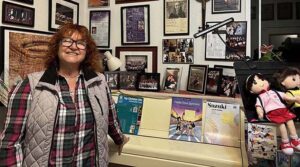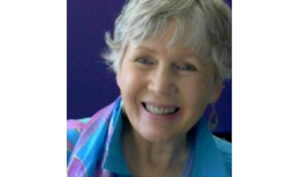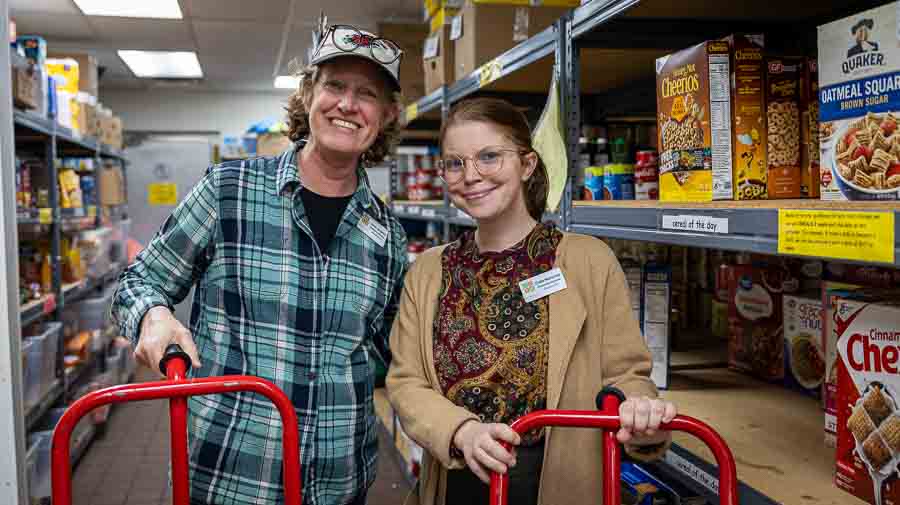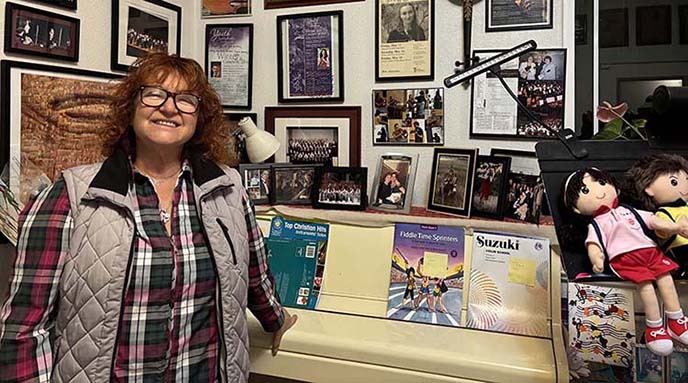The educator and author, who will talk about her book on Monday, Aug. 19, has always seen the bright side, even when she lived in a detention camp
By Debora Gordon for Ashland.news
After the Japanese bombing of Pearl Harbor on Dec. 7, 1941, America rounded up and incarcerated about 120,000 Japanese Americans. Mitzi Loftus’ family was held at Tule Lake beginning in May 1942.
After World War II, Loftus married became the mother to three sons, graduated from the University of Oregon and taught in both Oregon and Japan.
Mitzi and her son David Loftus will speak about her book “From Thorns to Blossoms: A Japanese American Family in War and Peace” at 6:30 p.m. Monday, Aug. 19, at Carpenter Hall. Their discussion of the book at Bloomsbury Books in April drew a capacity crowd.
Book talk
Mitzi Asai Loftus and her son David Loftus will present her book “From Thorns to Blossoms: A Japanese American Family in War and Peace” from 6:30 to 8 p.m. Monday, Aug. 19, at Carpenter Hall, 44 S. Pioneer St., Ashland. The free event is sponsored by Ashland Together and Bloomsbury Books.
Today, Loftus, an Ashland resident, says that even as our nation and world become more polarized, “I feel very sad and conflicted. I can’t believe that our country has come to the place it is. I thought that our country, our culture is better than many countries of the world.”
But, she says, “the negative seems to have taken hold and the number of people who are saying things and doing things that I’d never believe could possibly happen here (leave me) discouraged, disheartened, but not completely down the harbor. I’ve never been that way. I’ve always been a forward-looking, positive person.”
Handed down from her father
Loftus attributes her ability to stay positive to her father.
“I was given a strong foundation. My Zen Buddhist father’s silent influence was what has made it possible for me to be who I am, and that is to be positive, kind, never negative in any possible emotion. Without telling us, he basically said, “If you maintain negative emotions, they build up inside of you and grow and finally kill you. Anger, bitterness, accusative manners, unkind thoughts as well as acts; those things will destroy you. I attribute (my attitude) to my father’s influence. I’ve tried to live a conscious life — about what I eat, conscious about walking every day or doing some kind of exercise.
“I consciously hold a positive outlook and attitude in my everyday living. If a little negative thing starts creeping in, something in me talks back to me, says, ‘wait a minute, watch out, you’re going down the wrong path.’ I instruct myself, on a daily basis.”
Amid the frequent media focus on the problems of the world, Loftus keeps informed but still chooses positivity.
“I feel it is important to keep the avenues of news open, no matter how negative it is,” she says. “I have many friends who do not watch the news; I think that’s a terrible mistake. You have to face reality and decide what to do. I watch the news, I anguish over what I see and hear but it does not drag me down because I make a strong effort try to get back on the road to positivity and live in relation to our fellow human beings and not being always angry and critical … with anybody that we disagree with.”
Loftus refers to Tule Lake and the other detainment centers where Japanese people were sent as incarceration camps.
Not bitter over incarceration
Asked how she has maintained a positive outlook, even when reflecting on detention of people based on their ethnicity, she says, “I have never been angry about it, partly because I was so young; 9 years old when my family was taken away and incarcerated. I have tried to educate the public about what happened. I am amazed at how little the American public knows, so I have to continue talking about it, not out of anger. But I was born as an educator, so I’m always trying to educate people.”
Loftus did not think her parents were angry either.
“If that were the case, they didn’t show it,” she says. “The strength of my father’s Zen Buddhist faith was considered the correct path to take. I don’t remember my father ever being critical, angry in speech or action to anybody, even to people who did us wrong. It was never voiced or expressed in words. I never heard him say a mean or angry or hateful thing to anybody.”
Loftus suggests that talking with others about the injustices of today’s world “can help you and the person you’re talking with to … be prepared for the worst situations so that you can be proud of how you dealt with it afterwards.”
‘Engage your brain’
“Engage your brain a lot more than your heart,” she says. “Your mind controls what your heart’s going to do sometimes.”
Loftus believes it is possible to respond to violence without violence. “You need to speak up, not be afraid to make a strong statement which may draw some negative responses from other people. But it’s important to speak, because the hurts I felt were not from people who are bad, evil, mean people but good people who saw situations and said nothing, did nothing, when they knew in their hearts that they should say or do something.”
‘I preach to myself’
“Anytime I have in my mind anytime I start to do something, I wait a minute. You don’t want to say or do these things. “Wake up,” I preach to myself. I remind myself of what I want to be or how what I want to stand for what I feel proud to defend or promote and consciously do that. It’s just trying to catch consciousness of my heart, my soul, my mind, my breath.”
“Folks who have lived in those 10 relocation centers around the United States all eventually started what they call pilgrimage or reunion. Tule Lake was one of the first that really got going, and they started having them about every two years until the pandemic shut them down.”
In reference to anybody who’s a Japanese American person telling the story of the World War II incarceration or about the history of Japanese Americans, if you want to get a message to the people that you think is important, to coach your words and watch your message for any negative emotions that is anger, bitterness, accusatory, all of those things simply destroy the strength of your message.”
“I think that my message reaches more people because it always tries to be kindly and informative. And even when somebody is combative and comes up to me afterwards and says, ‘Mitzi, those things you told are lies,’ that they never happened, I don’t get angry. I just smile and say, ‘Well, I’m sorry that that was my life. I experienced it. I’m just telling it and I remember.’”
Loftus says the lesson she has learned from life is: “Accentuate the positive. And you’ll have a wonderful life, like I do.”
Learn more about Mitzi Loftus’ book here: “From Thorns to Blossoms: A Japanese American Family in War and Peace.”
Debora Gordon is a writer, artist, educator and nonviolence activist who recently moved to Ashland from Oakland, California. Email her at [email protected].





















